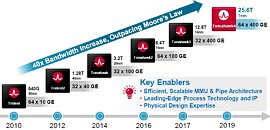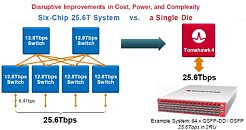Thursday, December 19th 2019
Broadcom Ships 25.6 Tbps Network Switch on 7 nm Chip
Broadcom has today started shipping its latest Tomahawk 4 chip for network switches, used by all hyperscale cloud providers like Google, Microsoft, and Amazon. The Tomahawk 4 is a processor built using a 7 nm manufacturing node from TSMC. Featuring over 31 billion transistors, the chip is one of the largest ever Broadcom built. It is an improvement to the Tomahawk 3, which achieved 12.8Tbps. This new chip is having two times the bandwidth available, resulting in 25.6 Tbps speeds while still achieving the form of a single die.
To achieve the massive throughput of 25.6 Tbps, Broadcom put 512 PAM4 SerDes blocks running at 50 Gbps on a single monolithic design. Capable of supporting 64 ports of 400GbE or 256 ports of 100GbE, the Tomahawk 4 is said to bring costs of operations down by 75% due to the less required power and hardware to operate 25.6 Tbps switch, where in the past it was required to run multiple switches to achieve such throughput. Additionally, to control all the telemetry processing and run the switch firmware, four Arm CPUs running at 1 GHz are embedded in die to help out.
Sources:
TheNextPlatform, Tom's Hardware
To achieve the massive throughput of 25.6 Tbps, Broadcom put 512 PAM4 SerDes blocks running at 50 Gbps on a single monolithic design. Capable of supporting 64 ports of 400GbE or 256 ports of 100GbE, the Tomahawk 4 is said to bring costs of operations down by 75% due to the less required power and hardware to operate 25.6 Tbps switch, where in the past it was required to run multiple switches to achieve such throughput. Additionally, to control all the telemetry processing and run the switch firmware, four Arm CPUs running at 1 GHz are embedded in die to help out.


8 Comments on Broadcom Ships 25.6 Tbps Network Switch on 7 nm Chip
Whoa. o_O
Infrastructure improving is well and good, but this won't lead to tangible benefits for end users in a long, long time.